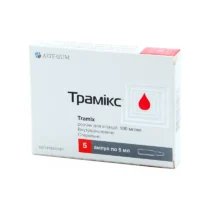Description
Aminocaproic Acid Tablets
Composition:
Each tablet contains 0.5g of Aminocaproic Acid.
Mechanism of Action:
Aminocaproic acid inhibits the breakdown of blood clots by preventing the activation of plasminogen, thus promoting hemostasis and reducing bleeding episodes.
Pharmacological Properties:
Upon oral administration, Aminocaproic Acid is rapidly absorbed and acts as an antifibrinolytic agent by stabilizing blood clots.
Indications for Use:
Aminocaproic Acid tablets are indicated for the treatment of excessive bleeding resulting from surgical procedures, trauma, or specific medical conditions.
Contraindications:
Avoid using Aminocaproic Acid tablets if you have a history of hypersensitivity to the drug or a predisposition to blood clots.
Side Effects:
Common side effects may include nausea, vomiting, diarrhea, or dizziness. If you experience any severe side effects, contact your healthcare provider immediately.
Usage Instructions:
The typical dosage is 1-2 tablets taken orally 3-4 times a day. Adhere to the prescribed dosage and do not exceed the recommended amount.
Advantages Over Analogues:
Aminocaproic Acid has demonstrated comparable efficacy to other antifibrinolytic agents in controlling bleeding episodes, with a well-tolerated safety profile.
Suitable Patient Groups:
Aminocaproic Acid can be used in various patient populations, including children and the elderly, under appropriate medical supervision.
Storage and Shelf Life:
Store Aminocaproic Acid tablets in a cool, dry place away from direct sunlight. Check the expiration date on the packaging and do not use expired medication.
Packaging Description:
Aminocaproic Acid tablets are available in a package containing 20 tablets of 0.5g each.
Clinical Evidence:
Aminocaproic Acid has been shown to effectively reduce bleeding during surgical procedures and in patients with bleeding disorders. Clinical trials have supported its use in various clinical scenarios.





